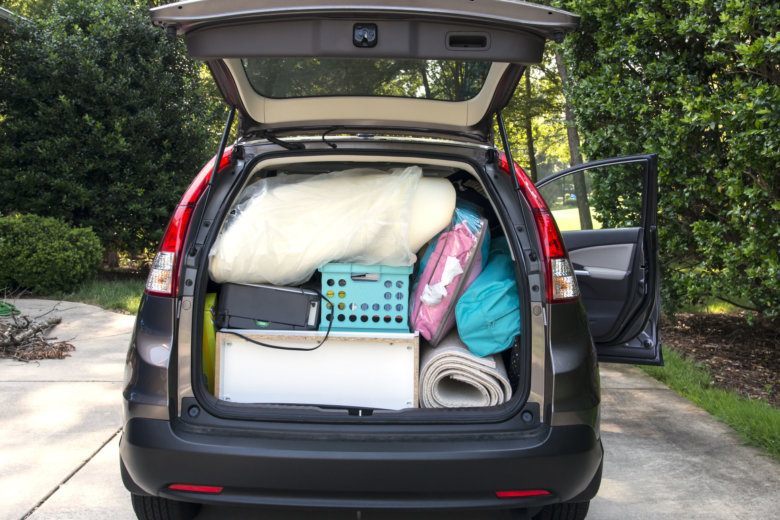
Starting college can stir up a mix of emotions, including excitement and nervousness about what’s to come. As students grapple with living independently and away from familiar people and places — often for the first time — homesickness is common.
These feelings are not just experienced by first-year students. Homesickness can arise at any time throughout a student’s college career.
“I think students can experience homesickness in a way that ebbs and flows throughout the time,” says Jana Valentine, assistant vice president of student life at Bryant University in Rhode Island.
After Thanksgiving or winter break, for instance, “a lot of students who were feeling OK may feel homesick because they were just home,” she says. “It’s something that comes and goes.”
Whether feelings of homesickness emerge as a freshman or continue into senior year, here are some ways for students to cope.
What’s It Like to Be Homesick?
In the most literal sense, homesickness is the fear of missing out on what’s going on at home while being in a different place.
[See: Don’t Make These 8 Freshman Mistakes in College.]
Signs of homesickness vary, but students may experience a shift in their personalities, face feelings of sadness, anxiety and stress, or have a difficult time engaging in their favorite activities for a short period of time.
“We really want those students who are having these feelings to recognize that like it’s normal and temporary,” says Stephanie Marcello, chief psychologist at Rutgers University Behavioral Health Care in New Jersey. “Obviously, the kids who this is continuing on for we want them to seek help.”
She emphasizes that “homesickness is not a diagnosis” and feelings of “longing or missing” could increase for those who are predisposed to or were already dealing with anxiety or depression.
“It’s important to acknowledge that college is a major life transition,” says Kristen Missall, a professor of education and director of the school psychology program at the University of Washington. “It’s going to cause discomfort. It’s going to cause a lot of challenges, everything from how a person feels in a day to maybe even how they sleep at night. Things become a problem when they persist longer than they should. And that ‘should’ is different for everyone.”
Ways to Cope With Homesickness
Homesick students should bring and share comfort items from home, schedule chats with loved ones, maintain a routine, get involved on campus and seek out help if needed.
“Sometimes with the feeling of loneliness, we can start to feel like we’re the only one who is experiencing that,” says Margaret Morgan, director of the Center for Student Support and Care at the University of Notre Dame in Indiana. “The feelings of loneliness, especially moving somewhere new, is an incredibly typical experience. So giving yourself permission to feel those things and acknowledging that’s a part of it is huge.”
Bring and Share Comfort Items From Home
Whether it’s a decade-old stuffed animal, piece of jewelry, blanket or a painting, many items can remind someone of home. Experts advise students to bring those comfort items to their dorm room or apartment and display pictures of pets or family members.
Missing certain foods can also cause homesickness. While many dining halls have expansive options, the food doesn’t usually compare to family recipes and home-cooked meals. Students can try to recreate those meals on their own or find a local restaurant near campus that evokes memories of home and invite friends to eat there with them, experts say.
[READ: Campus Support Every First-Year College Student Should Use.]
Schedule Chats With Loved Ones
Students should find ways to stay in touch with people at home, like scheduling times to talk with their parents, siblings or friends, or even video chatting with their pets. But they should try to avoid clinging to these scheduled chats, Morgan says.
“Scheduling those things and clinging (to) those things are totally different in the sense that clinging doesn’t allow you to meet the new people, try the new experiences or kind of push yourself to be out with other people,” she says. “Scheduling those things gives you some comfort to know that they’re there. … Not letting yourself move past them is more what I would say is clinging.”
Maintain a Routine
Experts advise students to maintain some type of routine in their new environment, just as they likely did at home. For instance, students may want to aim to go to bed at a similar time every night, get to class on time, attend a club meeting each week and have designated study times.
“Humans, particularly in times of transition, need both routine and clear expectations,” Missall says.
Get Involved on Campus
Colleges and universities offer clubs and organizations to meet a variety of students’ interests, such as theater, debate and intramural sports teams. Participating in clubs or attending events on campus can help students meet peers with shared hobbies or try something new, experts say.
“Think about what it is exactly that you are missing and find ways to incorporate that in,” Morgan says. For instance, students with pets at home may want to consider volunteering at a local rescue, or those with a religious upbringing can find a related faith-based organization on campus.
Seek Out Help
While homesickness is common, it should pass over time, experts say. Students can share their feelings and concerns with their resident adviser or even a trusted faculty member.
However, if the feelings persist and become worse, experts advise reaching out to mental health counselors on campus. There are also other mental health resources available nationwide, such as the 988 suicide and crisis hotline.
“They’re dealing with a loss,” says Marcello, who is also the assistant vice president of academics, integration and innovation at Rutgers UBHC. “They’re dealing with grief. Talk to people about it. Get as connected as you can and reach out for help if it’s not getting better. You really don’t have to go through this by yourself. There’s so many supports at college campuses because this is a totally normal and understandable transition that they’re going through and it will pass. And if it doesn’t, we’re here to help you.”
What to Avoid When Homesick
Feelings of homesickness may increase if students schedule too many trips back home to visit loved ones, compare friends’ college experiences to their own or stay isolated, experts say.
[READ: How Parents Can Support the Adjustment to College]
Planning Constant Trips Home
Experts advise students against going home for at least four to six weeks into their first semester, as there are usually lots of scheduled campus activities on the weekends and evenings during this time period.
“When students leave or go home for those weekends, they miss those key moments of forming community and bonding with people,” Morgan says.
Comparing Yourself to Friends
Although friends from home may post photos of themselves on social media having fun and meeting new people, that doesn’t mean they aren’t experiencing homesickness, too.
“Comparing yourself to what your other friends are doing, especially your friends that decide to stay home, I think that’s something that makes things really hard,” says Niki Fjeldal, first-year class dean and director of orientation at Allegheny College in Pennsylvania. She says be wary of social media, which often causes students to make those comparisons.
Isolating Yourself
If homesickness is leading to feelings of loneliness, anxiety or sadness, students may not want to leave their room. But participating in activities on campus and attending class serve as healthy distractions, experts say.
“Force yourself to take those steps to become an active member in the community,” Valentine says. “I think this is really hard, especially for the generation of students that we’re working with now. For a couple of years, they were going to school in their homes, maybe in their room, basement or living room. And it’s just become such a common practice after our COVID times to just be isolated in a space. I think our students that are coming to college now have a little bit bigger challenge than we’ve ever seen before to break out of staying in their room all the time.”
Searching for a college? Get our complete rankings of Best Colleges.
More from U.S. News
What to Know About College Admissions Forums
12 Colleges That Offer Unique, Healthy Dining Options
10 Environmentally Friendly College Campuses
How to Handle Homesickness in College originally appeared on usnews.com







